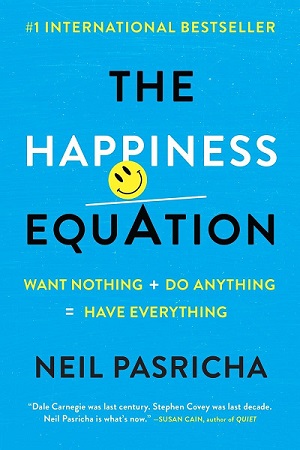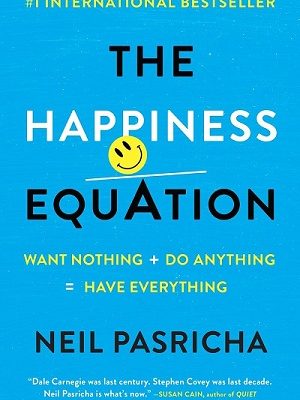The Happiness Equation: Want Nothing + Do Anything = Have Everything by Neil Pasricha offers powerful insights on how to achieve lasting happiness. The book provides a framework to help individuals remove mental roadblocks and live a fulfilling life by focusing on mindset, habits, and the way we define success. Below are all the lessons discussed in the book:

Read: Happiness: Lessons from a New Science
1. Happiness is a Choice, Not a Result
- Pasricha emphasizes that happiness comes from within, not from external success or material possessions. The book challenges the common belief that success leads to happiness, instead flipping it by saying that happiness is the precursor to success. Pasricha teaches that by choosing to be happy, you create the right mindset for achieving everything else.
2. Don’t Wait for Happiness
- We often delay our happiness until we achieve certain goals like getting a promotion or buying a house. Pasricha explains that you shouldn’t wait for external milestones to be happy. Instead, learn to enjoy the present moment and focus on creating happiness now. This involves finding joy in everyday activities and reframing negative thoughts into positive ones.
3. Want Nothing
- The lesson of “Want Nothing” is about embracing contentment. By wanting less, you reduce the mental burden of constantly chasing after things. When you reduce your desires, you become free from the constant dissatisfaction that often comes from comparing yourself to others or striving for material gain. Pasricha advocates for gratitude and appreciating what you have, which leads to more sustainable happiness.
4. Do Anything
- “Do Anything” emphasizes the power of taking action. Instead of being paralyzed by the fear of making the wrong choice, Pasricha advises that any action is better than inaction. He suggests that by trying new things, failing, and learning, you expand your experiences and grow. This mindset helps people move forward in life without being bogged down by the need for perfection.
5. Have Everything
- Once you embrace the idea of wanting less and taking action, Pasricha argues that you will feel as though you already “have everything.” By shifting your mindset and being grateful for what you already possess, both emotionally and materially, you reach a point of fulfillment and happiness. It’s not about acquiring more but recognizing that you already have what you need.
6. The Lottery Question: Retire and Do What You Love
- One of the exercises Pasricha introduces is the “lottery question”, which asks you to imagine what you would do if you won the lottery and didn’t have to work for money anymore. This helps clarify what your true passions are. The idea is to stop waiting for retirement or a windfall to live the life you want and start aligning your work and personal life with those passions now.
7. The Success Formula is Flawed
- Most people believe that if they work hard, they will become successful, and only then will they be happy. Pasricha calls this the flawed success formula, noting that the pursuit of success often leads to burnout and dissatisfaction. Instead, he flips the formula: Be happy first, and that happiness will drive your success. The key is to cultivate happiness daily through small, intentional habits.
8. Find Meaning, Not Money
- Pasricha argues that purpose and meaning are far more important than money when it comes to happiness. Studies show that people who find meaning in their work and personal lives report higher levels of well-being. By focusing on what brings you joy and fulfillment, rather than what brings in the most money, you set yourself up for long-term happiness.
9. Be the 5%
- According to Pasricha, only 5% of people truly live fulfilling and happy lives. He challenges readers to join this 5% by taking control of their own happiness, making intentional choices, and not following societal expectations blindly. It’s about breaking free from the norms that tell you success comes from material wealth and status, and instead focusing on personal fulfillment.
10. Unlearn What You Think You Know About Happiness
- A central theme in the book is that many of our beliefs about happiness are misguided. Pasricha encourages readers to unlearn societal expectations about how happiness works, particularly the notion that external achievements lead to internal joy. He advocates for rethinking our approach to happiness, focusing on internal development rather than external validation.
11. Lower Your Expectations
- While ambition and goal-setting are important, Pasricha suggests that lowering your expectations can help increase happiness. When you set overly high expectations for yourself or others, disappointment is often inevitable. By lowering your expectations, you set yourself up for more pleasant surprises and fewer frustrations.
12. The Importance of Gratitude
- Gratitude is a powerful tool for increasing happiness. Pasricha advises practicing gratitude daily by reflecting on things you’re thankful for, no matter how small. This simple practice rewires your brain to focus on the positive aspects of your life, helping you to maintain a happier and more content mindset.
13. Subtract, Don’t Add
- Pasricha suggests that happiness can be achieved not by adding more to your life but by subtracting the things that don’t serve you. This might include reducing your commitments, letting go of toxic relationships, or cutting out unnecessary tasks. Simplifying your life allows you to focus on the things that truly matter, leading to greater contentment.
14. The 20-Minute Rule
- The 20-minute rule is a practical strategy Pasricha offers for overcoming procrastination and building momentum. He advises setting a timer for 20 minutes and working on a task during that time, with no pressure to continue beyond it. Often, you’ll find that getting started is the hardest part, and once you’ve begun, it’s easier to keep going.
15. Happiness Requires Effort
- Happiness is not a passive state that happens by chance. Pasricha stresses that it requires intentional effort and daily practices. Whether it’s through gratitude exercises, mindfulness, or taking action on your goals, creating happiness in your life is something you have to work at consistently.
16. The Power of Perspective
- Perspective is everything when it comes to happiness. Pasricha emphasizes the need to change your perspective on problems and challenges, viewing them as opportunities for growth rather than setbacks. By adopting a more positive, solutions-oriented mindset, you can turn negative situations into learning experiences, thus boosting your overall happiness.
17. Serve Others
- Helping others and being of service is a surefire way to increase your own happiness. Pasricha discusses how altruism and kindness have been proven to boost well-being. By giving back to others—whether through volunteering, offering support, or simply being kind—you not only help those around you but also cultivate a deeper sense of fulfillment in your own life.
18. Create a Happiness Ritual
- Pasricha suggests creating daily happiness rituals that help you maintain a positive mindset. Whether it’s a morning routine that sets a positive tone for the day or evening reflection on things you’re grateful for, establishing rituals keeps happiness top of mind. These small, regular habits contribute to long-term well-being.
19. Success Does Not Equal Happiness
- Contrary to what many believe, success does not automatically lead to happiness. Pasricha emphasizes that external markers of success like wealth, fame, and power are often fleeting and fail to bring lasting joy. Instead, focusing on internal factors like personal growth, relationships, and meaning is far more important for sustainable happiness.
20. Learn to Say No
- Learning to say no to things that drain your energy or don’t align with your values is crucial for maintaining happiness. Pasricha advises setting boundaries and prioritizing the things that bring you joy and fulfillment. By saying no to unnecessary commitments, you free up time and energy for the things that truly matter.
21. Embrace Imperfection
- Pasricha encourages readers to let go of perfectionism and embrace their imperfections. Perfectionism can be a barrier to happiness because it sets unattainable standards and leads to constant self-criticism. By accepting yourself as you are and recognizing that mistakes are part of growth, you can lead a more fulfilled and less stressful life.
Conclusion:
Neil Pasricha’s The Happiness Equation offers a fresh, scientifically backed perspective on happiness, challenging conventional wisdom about success and joy. The book emphasizes that happiness is a choice and that by shifting our mindset, simplifying our lives, practicing gratitude, and focusing on meaning rather than material gain, we can create a life of lasting happiness. These lessons not only help individuals find personal fulfillment but also guide them to build a balanced, joyful life free from societal pressures and expectations (Amazon).



